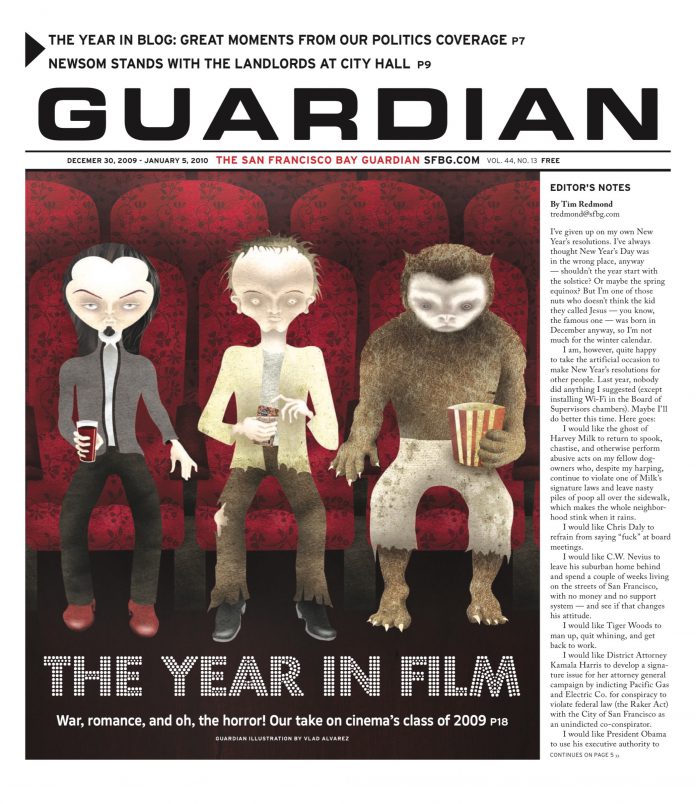YEAR IN FILM I will follow him. The opening moments of Pablo Stoll’s Hiroshima convey that sentiment’s dedication in a single shot, a lengthy behind-the-shoulder look at Stoll’s brother Juan Andres as he traverses a suburban street in Uruguay. Such a simple film, Hiroshima: a day-in-the-life structure; silent film intertitles instead of spoken dialogue; “only” one brother’s look at another. Yet there is passion beneath Juan Andres Stoll’s mute detachment, and grief beneath Pablo Stoll’s at times humorous familial portrait of a half-somnambulant with dark circles around his eyes. The passion is revealed in the final scene, when the film’s potent and unconventional use of music reaches a climax. The grief floats around the edges of the screen, and is locked within the closing dedication to Juan Pablo Rebella, Stoll’s co-director on 2001’s 25 Watts and 2004’s Whisky, who killed himself with a gun three years ago, at 32.
Mapping infinite negative space within the movie maze, I can’t help but see Stoll’s brother as Rebella, and connect Hiroshima’s opening shot with the last major shot of Whisky: an uncomfortably extended look at forsaken Marta (Mirella Pascual), tears streaming down her face, in the back of a taxi going who knows where. When Whisky was released, that scene might have seemed like a pale descendant of the notorious 10-minute crying jag at the end of Tsai Ming-liang’s 1994 Vive l’amour. But as time goes on, the increasingly arch Tsai’s vision of isolated sorrow seems less genuine, if not potent. In contrast, Whisky‘s farewell is some kind of transformation, a baton, both end and beginning.
Wherever he may go. Last week, rummaging through a drawer, I came across Alexis Tioseco’s card. My heart hurt more than usual. I remember when I first saw Alexis, at a screening of Jacques Rivette’s Out 1 in Vancouver. During short breaks between segments of Rivette’s 12-hour opus, I’d wonder who he was, recognizing he was important to me before we’d even said hello. A few days later, after we’d met, I remember him walking out of an obnoxiously provocative film, and how his wasn’t an empty or dramatic gesture, just an honest decision. At the end of the festival, Alexis, the filmmaker John Torres, Chi-hui Yang, and I had dinner, and over the course of close conversation with knees touching, I realized my nascent crush was actually a matter of meeting someone extraordinary whom I admired. A month or two later, Alexis let me excerpt part of one of his best essays for the type of year-end Guardian film issue you’re reading now.
On Sept. 1, Alexis and his girlfriend and fellow writer Nika Bohinc were shot to death in their apartment in Manila. There are tributes to them online, many written by people who knew him far better than I. I’m trying now, but I can’t pay respect to Alexis yet. When I’m not feeling rage about his killing, I’m haunted by the purity of his commitment to film and his culture, and how I fall short of it. (As for most U.S. film critics, don’t get me started. The entertain-me imperial indulgence typical of them is especially disgusting in the context of Alexis’s death, a context it now lives within for me.) My failure is something I think about daily, and aim to change.
This is not sentimental. Alexis wasn’t faultless, but he was that special. I remember coming across a short entry on one of Alexis’s sites that not just pointedly but also poignantly exposed the colonialism of a Bruce Baillie film. That little piece of illustrated writing provided a counterpoint to Apichatpong Weerasethakul’s valuable appreciations of Baillie. I thought about it this year through tear-blurred eyes while watching Apichatpong’s For Alexis. “The Letter I Would Love to Read to You In Person,” Alexis’s essay for Nika, is a great piece of film writing. Its title is downright painful to behold. Revolutions happen like refrains in a song, he wrote. I will follow him, wherever I may go.

